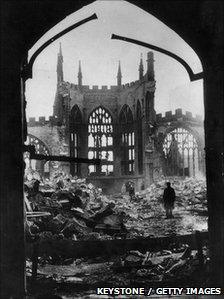The Coventry Blitz 'conspiracy'
- Published

It's 70 years since Germany launched one of the most devastating bombing raids of World War II, on Coventry. But did Winston Churchill have prior warning of the attack?
It has been claimed in a number of books that the wartime prime minister knew that the city was to be targeted by the German Luftwaffe, but chose to do nothing because it would have alerted Adolf Hitler to the fact the Allies had recently cracked the Nazis' top-secret Enigma codes.
Coventry and its people were sacrificed, the theory goes, "for the greater good" - that is, that the benefits of playing the long game outweighed the short-term costs of leaving the West Midlands city to a terrible fate.
It's not just historians who have written about the so-called Coventry conspiracy, though - it's a theory which lives on to this day.
Jean Taylor spent the night of her 14th birthday in a communal shelter, utterly terrified. Speaking ahead of the 70th anniversary, she said: "The rumour was that they decided to sacrifice the few (in Coventry) to save the many. Nobody has ever confirmed or denied that, and that says a lot."
But was Sir Winston really such a utilitarian - the philosophical term given to those who strive to bring about the greatest gain for the greatest number, even though that means making painful sacrifices?
Or is the explanation far more mundane than the conspiracy theorists believe - that Mr Churchill and his advisors were just as much in the dark about the Germans' Operation Moonlight Sonata as the people who spent the night cowering in their shelters?
The conspiracy theorists argue that Sir Winston chose to sacrifice the city to keep secret Britain's decoding of the Germans' Enigma machine.
Their position initially gained credence during the 1970s with the publishing of several books about the cracking of Enigma.
In his book The Ultra Secret, the former World War II intelligence officer FW Winterbotham recalled how he passed intelligence on to Churchill that Coventry would be the target of the bombing raid a few hours before it took place.
His account has been questioned since by several historians.
But Coventry-born writer Alan Pollock explores the theory in his play One Night In November, currently performing at the city's Belgrade Theatre.
He says an RAF report reveals that by 1500 on the day of the raid - several hours before the bombing began - enemy navigation signals were intersecting over Coventry, indicating an imminent raid.
"By this time, every non-Enigma source of intelligence was also pointing toward the Midlands, and increasingly toward Coventry," he adds.
Pollock also notes that Sir Winston's private secretary, John Martin, subsequently recorded that Churchill received a red box containing details of the raid shortly after 1500. Churchill apparently told Martin a heavy raid on London was predicted, and headed for the capital.
"Whether John Martin's recollection was accurate, and whatever Churchill's reasons for saying what he did, the only thing we can be pretty certain of is this: that piece of paper could not possibly have carried the information that the beams indicated London," Pollock argues.
However, Terry Charman, senior historian at the Imperial War Museum is sceptical of the conspiracies - arguing that while British intelligence knew Moonlight Sonata was coming, they did not know what would be its target.
Enigma was, Mr Charman says, in its infancy at this stage, and while code-breakers deciphered a reference to "Korn" - the German code name for Coventry - they believed it referred to a radar system rather than a location.
Mr Charman says it is significant that Mr Martin, the only witness to Mr Churchill opening the red box, believed the prime minister "genuinely didn't know that Coventry was to be attacked - he thought London was the target".
The fact that a small air raid did in fact occur in London that night, Mr Charman adds, gives credence to the suggestion that the box really did predict a raid in the capital - and suggests Mr Churchill's haste to return to the city was founded on a genuine desire to be where the action was.
Mr Charman says the RAF did indeed detect the the navigation signals over Coventry, but tried to intercept and then jam them; one theory suggests this failed because the wrong frequency was chosen.
Plus, he argues, there would have been very little the British authorities could have done to protect the people of the city even if they had been forewarned.
"Even if you had put every air raid defence in the country around Coventry it would still have been devastating," he adds. "People prefer to think of things as a conspiracy.
"But even if Churchill had known at that short notice (that Coventry was to be targeted) imagine the logistics of evacuating a city the size of Coventry - it would have been enormous."